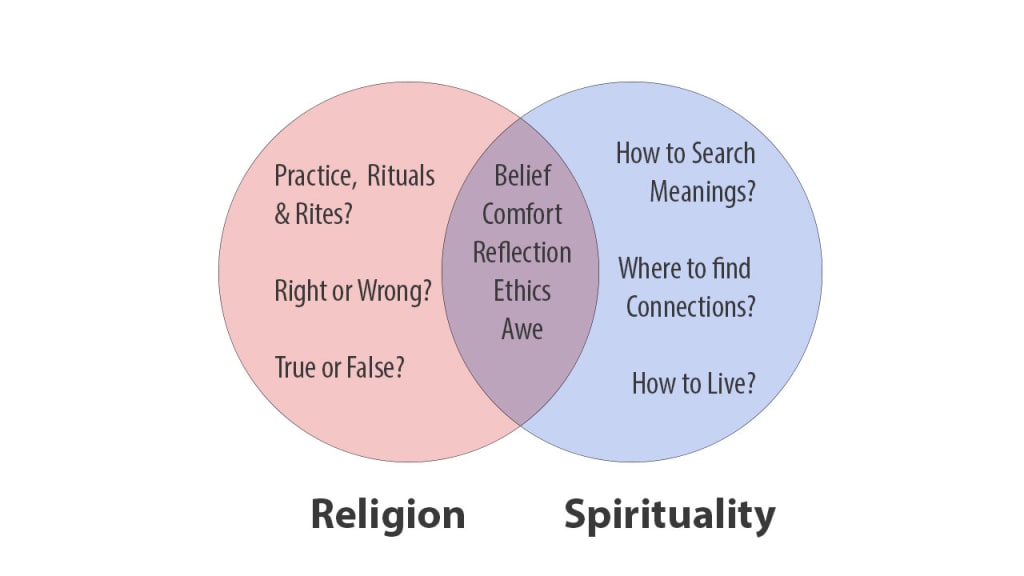Exploring the Depths: Religion and Spirituality
A Profound Comparison

Introduction:
In the realm of human existence, the quest for deeper meaning and purpose has given rise to various avenues of exploration. Among them, religion and spirituality have captivated countless hearts and minds throughout history. While often used interchangeably, religion and spirituality embody distinct yet interconnected dimensions of human experience. In this article, we will embark on a compelling journey to compare and contrast religion and spirituality, delving into their unique aspects, shared foundations, and their potential to enrich our lives.
Definitions and Characteristics:
Religion, traditionally bound by organized institutions, rituals, and doctrines, provides a structured framework for belief, worship, and moral conduct. It often includes a community of followers and sacred texts that guide adherents in their spiritual journey. On the other hand, spirituality transcends the confines of organized religion and emphasizes a personal connection with the divine or higher power. It encompasses a diverse range of practices such as meditation, mindfulness, contemplation, and self-reflection. Spirituality is an individualistic and introspective path that encourages seekers to explore their inner self and experience a profound connection with the transcendent.
Shared Aspects:
Despite their differences, religion and spirituality share essential aspects that intertwine their significance. Both address the fundamental questions of human existence, exploring the purpose of life, the nature of reality, and the concepts of morality and ethics. Both religion and spirituality provide a sense of solace, offering comfort and support during challenging times. They provide a framework for moral guidance and encourage adherents to cultivate virtues such as compassion, forgiveness, and gratitude. Moreover, both religion and spirituality foster a sense of community and belonging, creating spaces for shared rituals, celebrations, and collective experiences of transcendence.
Differences in Approach:
One key distinction between religion and spirituality lies in their approach to the divine or higher power. Religion tends to define this power within a structured belief system, often personifying it as a deity or multiple deities. Adherents follow prescribed rituals and practices, placing faith in a set of doctrines and dogmas. In contrast, spirituality focuses on cultivating a direct and personal connection with the divine, free from intermediaries or specific rituals. It encourages seekers to explore their inner selves, connect with their intuition, and seek answers through introspection, meditation, and other spiritual practices. Spirituality offers a more fluid and adaptable path, allowing individuals to find their own unique understanding of the transcendent.
Individualistic vs. Communal:
Another significant aspect that sets religion apart from spirituality is the communal nature of religious practice. Religion provides a framework for organized worship and congregational activities, fostering a sense of unity and shared identity among its adherents. Religious communities offer support, socialization, and a platform for collective growth and transformation. Spirituality, in contrast, primarily focuses on the individual's inner journey and personal relationship with the divine. While spiritual seekers may participate in group meditations or seek guidance from spiritual teachers, the emphasis remains on personal transformation and self-realization.
Belief Systems vs. Inner Experience:
Religion often revolves around specific belief systems and doctrines that guide the faith and practices of its followers. These beliefs are often based on sacred texts, theological teachings, and historical traditions. Adherents find comfort and guidance in the established teachings, rituals, and moral codes provided by their religious traditions. Spirituality, on the other hand, prioritizes the individual's inner experience and personal exploration of the divine. It encourages seekers to tap into their intuition, inner wisdom, and direct experiences of transcendence. Spirituality emphasizes the importance of subjective experiences, such as moments of awe, interconnectedness, and a deep sense of purpose, which may not always align with traditional religious frameworks.
Rituals and Formalities vs. Freedom and Fluidity :
Religion often places great importance on rituals, ceremonies, and formalities as a means of connecting with the divine and expressing devotion. These rituals provide a structure for worship, prayer, and communal gatherings. Religious adherents find solace and a sense of belonging through these shared practices. Spirituality, on the other hand, embraces a more fluid and flexible approach. Seekers have the freedom to choose the spiritual practices that resonate with them personally, whether it's meditation, mindfulness, energy healing, or any other modality. There are no fixed rules or prescribed rituals in spirituality, allowing individuals to adapt their practices to their unique needs and preferences.
Dogma and Hierarchy vs. Inner Authority and Equality:
Religions often have established dogmas, doctrines, and hierarchical structures that govern their beliefs and practices. Religious authorities, such as clergy or religious leaders, play a central role in interpreting and enforcing these doctrines. Adherents are expected to follow the prescribed teachings and authority figures, placing their faith in the wisdom and guidance of the religious institution. In spirituality, there is a greater emphasis on personal autonomy and inner authority. Seekers are encouraged to trust their own intuition, inner guidance, and direct experiences of the divine. There is a sense of equality among spiritual seekers, as each individual is seen as having the capacity to access spiritual truths and connect with the transcendent directly, without the need for external intermediaries.
Conclusion:
In the tapestry of human experience, religion and spirituality stand as two interconnected yet distinct paths towards understanding the divine and seeking a greater purpose. Religion provides structure, community, and defined beliefs, while spirituality offers personal exploration, direct connection, and flexibility. Together, they enrich our lives, empowering us to embark on a profound journey of self-discovery and transcendence.
About the Creator
Frank Odhiambo
Frank Odhiambo is a seasoned and passionate writer renowned for his compelling and thought-provoking pieces. Global award winner for "Voice of reason" He has established himself as a prominent voice in the world of authors and writers.
Enjoyed the story? Support the Creator.
Subscribe for free to receive all their stories in your feed. You could also pledge your support or give them a one-off tip, letting them know you appreciate their work.






Comments
There are no comments for this story
Be the first to respond and start the conversation.